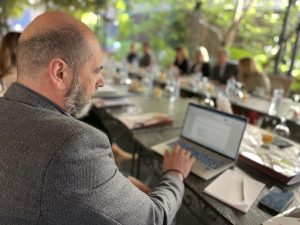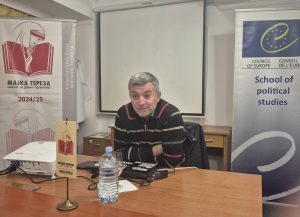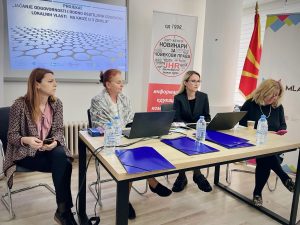04.05.2007
 On May 6th 2007, the French will elect their new Président de la République replacing the Monsieur Jacques Chirac ruling the country for 12 years and paving the way for new and fresh flow of ideas in French and EU foreign affairs. The primary reason for the EU’s and candidate countries high tempered interest in French election is that its outcome will determine the future of the Union itself.
On May 6th 2007, the French will elect their new Président de la République replacing the Monsieur Jacques Chirac ruling the country for 12 years and paving the way for new and fresh flow of ideas in French and EU foreign affairs. The primary reason for the EU’s and candidate countries high tempered interest in French election is that its outcome will determine the future of the Union itself.
Macedonia, as a candidate country sees its own interest in the French presidential election through the lenses of the enlargement process and the process of institutional reform without which it seems that the enlargement can not continue. Many EU representatives including the enlargement commissioner Mr. Olli Rehn repeat the guaranties given that all Western Balkan countries have a future in the EU. Even so, these statements were given with prudence: that the speed of enlargement must take in account the EU’s “absorption capacity”, later renamed into “integration capacity”1. Following elections in the Europe’s three largest economies— with Angela Merkel as German Chancellor, Gordon Brown as the most probable Britain’s next prime minister and the new French President—the long waited process of reforms in the Union can begin commence. It is expected that after the elections France will take its position as a leader and promoter of the European integration process (a foreign policy concept that its political elites have invented) on the arms of the revised text of the rejected EU constitution. This article briefly sketches the two presidential candidate’s political agendas from a standpoint of an EU candidate country. Which of the two candidates programs concerning EU is more suitable and appropriate for Macedonia?
The two candidates that will face each other in the second-round of the presidential runoff are the centre-right candidate Monsieur Nicolas Sarkozy, from the Union for a Popular Movement (UMP), and Madame Ségolène Royal from the Socialist Party.
In the first-round of the election, Mr. Sarkozy garnered 31% of the vote, while Ms. Royal, bidding to be France’s first female leader, took nearly 26%2. Although different in their views and ideas about the future of the EU, the enlargement process and the so-needed political reforms, both of the candidates remain pro-European oriented. They agree on one thing only, that resubmitting the existing EU constitutional text to the French electorate is not an option. However, the big challenge that lies ahead concerning the institutional reforms of the Union itself is how to push them forward following the French and Dutch rejection of the Constitution two years ago, while keeping in mind the voters concerns and belief about the document. The process of reforms was renewed under the German EU presidency, targeting at a new treaty in time for the 2009 election of the European Parliament. In this sense, the centre-right candidate, Mr. Sarkozy has proposed very reserved proposal, submitting new slim line constitutional treaty or traité simplifié which could be passed in the Assemblée nationale as a standard treaty revision, or put in a different way, simplified European treaty without a need of being submitted to a referendum. In effect he is revisiting some of the old Constitutional policies, such as creating a new position of EU Foreign Affairs Minister, increasing the budget for European Defense3 and implementing new rules in relation to majority voting as a voting procedure4. On the contrary, the centre-left candidate, Ms. Royal has proposed submitting some kind of new alternative, very imprecise new EU treaty with ‘social protocol’ for approval to national referenda5. With it, she wants to combat unemployment and relocation, and establish a minimum wage in each member state6, a high-risk tactic that may throw the EU yet again into a long period of uncertainty.
Which candidate is better for Macedonia? Sarko or Ségo? Which of the two candidates suits better Macedonia’s EU integration interests? To further the process of enlargement, the new EU treaty has to be reached by 2009. Without it, there should be no more expansion, as Mr. Rehn repeated couple of times this year. In this sense, Mr. Sarkozy proposal about traité simplifié is more appropriate for candidate countries like Macedonia.
With this kind of procedure, the odds for reaching EU consensus on the new Treaty are significantly higher. It will considerably decrease the possibility of another failure and stagnation of the Union as the one two years ago. The EU oriented foreign policy of the son and grandson of immigrants (his father was Hungarian, his maternal grandfather a Jew from Salonika) is a better option for Macedonia.
Endnotes:
1 Enlargement Commissioner Olli Rehn assessment on the term ‘integration capacity’ is based on three components: Institutional, EU policy impact and EU budget
2 French contenders set for run-off, BBC News Europe, April 23, 2007 http://news.bbc.co.uk/2/hi/europe/6582479.stm
3 Tous les programmes des candidats à la présidentielle 2007, Le Monde, March 16, 2007 http://www.lemonde.fr/web/articleinteractif/0,410@2-823448,49-822922@45-3054,0.html
4 Europe : le programme des candidats, Le Monde, March 13, 2007
http://www.lemonde.fr/web/articleinteractif/0,410@2-823448,49-895888@45-3371,0.html
5 Europe : le programme des candidats, Le Monde, March 13, 2007
http://www.lemonde.fr/web/articleinteractif/0,410@2-823448,49-895888,0.html
6 Tous les programmes des candidats à la présidentielle 2007, Le Monde, March 16, 2007 http://www.lemonde.fr/web/articleinteractif/0,410@2-823448,49-822922@45-3053,0.html





